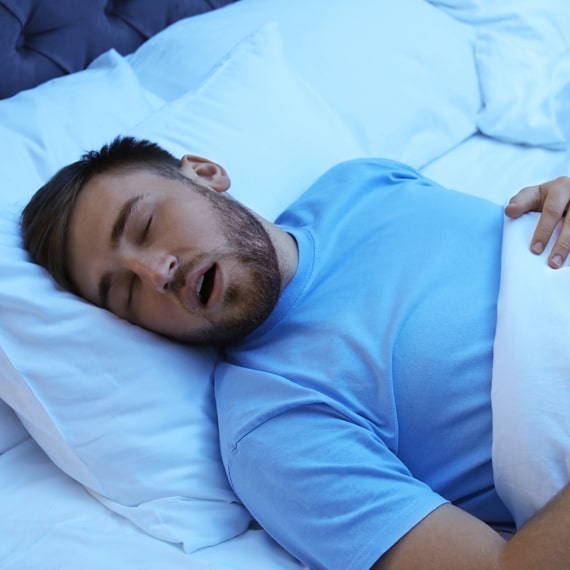
What is Sleep Apnea
Sleep apnea is a disorder that causes interruptions in breathing while sleeping. It is triggered by soft tissues in the mouth entering the airways while sleeping. Sleep apnea may hinder patients from obtaining enough rest at night, causing patients to wake up weary and sluggish. Sleep apnea patients may be more prone to health problems like cardiovascular diseases and hypertension. They are also predisposed to depression and other mental health problems.
Some cases of sleep apnea are triggered when a person’s tongue slides into their airways while they are sleeping. Fortunately, tongue exercises may aid in treating this form of sleep apnea. Exercise is typically an effective technique to train the tongue against obstructing regular breathing.
Why Do We Snore & How Can Mouth Exercises Help Stop Snoring and Sleep Apnea?
The area behind our tongue narrows as we sleep, and the tissue around it may become loose and relaxed. When air is driven through the tissue as we breathe, it flutters and leads to snoring. Obstructive sleep apnea (OSA) occurs when the floppy muscles at the back of the throat relax to the extent that they shut the airway. This might result in inadequate ventilation while sleeping.
Snoring and obstructive sleep apnea are typically caused by:
- floppy airway tissues,
- inadequate tongue alignment
- mouth breathing while sleeping.
Mouth and throat exercises help strengthen the airway and tongue muscles while encouraging nasal breathing. These activities are known as myofunctional or oropharyngeal exercises. The oropharynx is the region at the rear of your mouth that comprises the tongue, throat sides, tonsils, adenoids, and soft palate. According to an NCBI study, regular oropharyngeal exercises can help prevent soft tissues from becoming too floppy and vibrating during sleep. Toning these muscles has been found in several trials to help decrease snoring and milder cases of OSA.
Who Can Benefit From Mouth and Throat Exercises for Snoring?
Myofunctional exercises are beneficial to those with OSA when administered in combination with a CPAP machine. Individual characteristics, such as the size and form of a person’s mouth, tongue, and throat, may influence how practical these exercises may be. If a patient’s snoring is caused by alcohol or tranquilizers that relax the muscles at the back of the throat, oropharyngeal exercises may be less helpful.
How Often Do You Need To Do Mouth Exercises for Snoring or Sleep Apnea?
Building muscle takes time, just like any other workout. To notice an improvement in snoring or sleep apnea, we recommend doing mouth exercises for at least 10 minutes every day for three months.
What Can Mouth Exercises Help In Sleep Apnea?
Specific training approaches may improve the tongue, facial muscles, and throat. Each of these exercises may be combined in different ways.
Daily tongue exercises may help to reduce the intensity of sleep apnea by:
- Toning the tongue and throat muscle
- Enhancing the sturdiness of the soft palate
Mouth exercises may prevent snoring by engaging your facial muscles. These exercises can be performed many times each day.
This exercise increases nasal breathing, which helps to keep the airway stable when sleeping.
Vowel sounds engage the muscles in your throat. Purposefully repeating these sounds can help strengthen those muscles.
Singing requires the use of many muscles in the mouth and throat. It also involves the production of a variety of sounds, including vowels. Instead of singing the usual lyrics, try to repeat and strongly enunciate certain sounds when singing.
When Should You See A Doctor About Sleep Apnea
Some instances of snoring may be an indication of OSA. If misdiagnosed and mistreated, sleep apnea may have significant health repercussions. If you have any of the following risk factors, you may need to consult a doctor:
- Snoring that sounds like gasping, choking, or snorting
- Significant daytime drowsiness or weariness
- Mood swings, sluggish cognition, or a shorter attention span
- Headaches in the morning
- Hypertension & Obesity
Frequently Asked Questions
Are There Side Effects To Mouth And Throat Exercises?
Some patients may find myofunctional exercises tiresome or ridiculous, yet there are no adverse physical effects. However, before beginning or discontinuing any sort of snoring or sleep apnea therapy, consult with your doctor.
What Is The Fastest Way To Treat Sleep Apnea?
A popular and dependable approach to treating sleep apnea is using a continuous positive airway pressure (CPAP) machine. The CPAP machine delivers a constant airflow through a mask you wear while sleeping. It keeps your airway open. This enables you to snore less and sleep better.
How Do You Self-Treat Sleep Apnea?
The following are some home treatments that may help lessen sleep apnea symptoms:
- Keep a healthy weight
- Try yoga
- Change your sleeping posture
- Use a humidifier
- Avoid drinking and smoking
- Consider oral appliances
What Is The Best Sleep Position For Sleep Apnea?
Sleep apnea can be reduced by sleeping on your side with your back held straight. This position keeps your spine aligned and can help eliminate neck and back problems.
What Should I Avoid If I Have Sleep Apnea?
Here are some things to avoid that may raise your chances of developing sleep apnea:
- Use of tranquilizers or alcohol
- Smoking
- Fatty meat and high-fat dairy products
What Are The Types Of Sleep Apnea?
Here are the common types of sleep apnea:
- Obstructive sleep apnea: The most frequent type, which occurs when the muscles in the throat relax.
- Central sleep apnea: This condition develops when your brain fails to transmit correct signals to the muscles that regulate respiration.
- Complex sleep apnea syndrome occurs when a person has obstructive and central sleep apnea.
Conclusion
Sleep apnea is a severe sleep disease in which breathing fluctuates throughout the night. The typical signs of sleep apnea are snoring and early morning weariness, even after a whole night’s sleep. While mouth exercises are an effective home therapy, they are not a cure-all for snoring or sleep apnea. Although they are beneficial, they may need to be paired with other therapies prescribed by a doctor.

